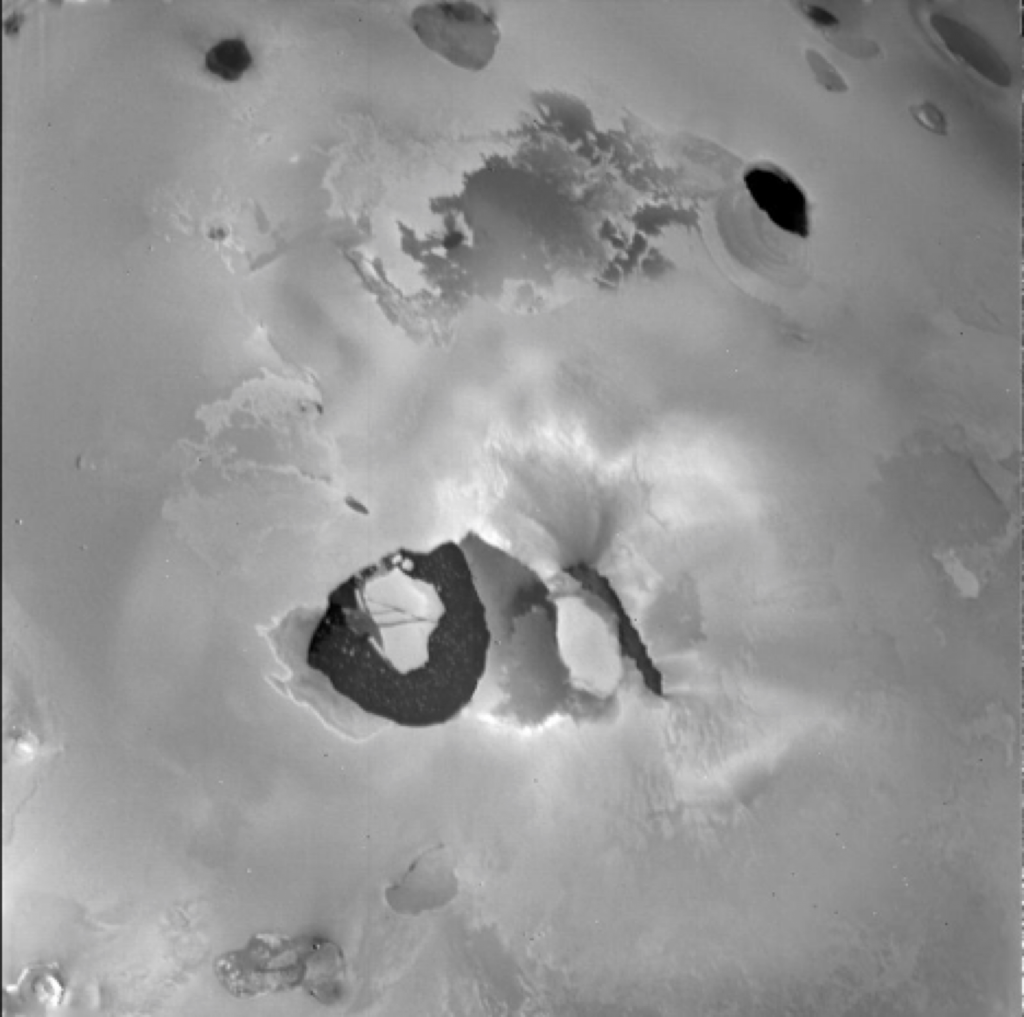Is huge volcano on Jupiter’s moon Io about to erupt this month?
Volcanic eruptions are difficult to predict, but observations have shown the largest and most powerful volcano on Io, a large moon of Jupiter, has been erupting on a relatively regular schedule.
The volcano Loki is expected to erupt in mid-September, 2019, according to a poster by Planetary Science Institute Senior Scientist Julie Rathbun presented today at the EPSC-DPS Joint Meeting 2019 in Geneva.
“Loki is the largest and most powerful volcano on Io, so bright in the infrared that we can detect it using telescopes on the Earth,” Rathbun said. Based on more than 20 years of observations, Loki undergoes periodic brightenings when it erupts on a relatively regular schedule. In 2002, Rathbun published a paper showing that the schedule had been approximately every 540 days during the 1990s. It currently appears to be approximately every 475 days.
“If this behavior remains the same, Loki should erupt in September 2019, around the same time as the EPSC-DPS Joint Meeting 2019. We correctly predicted that the last eruption would occur in May of 2018,” said Rathbun.
“Volcanoes are so difficult to predict because they are so complicated. Many things influence volcanic eruptions, including the rate of magma supply, the composition of the magma – particularly the presence of bubbles in the magma, the type of rock the volcano sits in, the fracture state of the rock, and many other issues,” Rathbun said.
“We think that Loki could be predictable because it is so large. Because of its size, basic physics are likely to dominate when it erupts, so the small complications that affect smaller volcanoes are likely to not affect Loki as much,” Rathbun said. “However, you have to be careful because Loki is named after a trickster god and the volcano has not been known to behave itself. In the early 2000s, once the 540 day pattern was detected, Loki’s behavior changed and did not exhibit periodic behavior again until about 2013.”
Rathbun’s research was funded by NASA New Frontiers Data Analysis and Solar System Observation programs and a National Science Foundation grant.
“Io’s Loki volcano: An explanation of its tricky behaviour and prediction for the next eruption. Julie A. Rathbun, Christian Tate, Paul Corlies, Alexander Hayes, and John R. Spencer, EPSC-DPS Joint Meeting 2019, 17 September 2019.
https://meetingorganizer.copernicus.org/EPSC-DPS2019/EPSC-DPS2019-769-1.pdf
“Loki, Io: A periodic volcano”, J. Rathbun, Geophysical Research Letters 29(10), May 2002.
Images

https://www.europlanet-society.org/wp-content/uploads/2019/09/Loki.png
Science contact
Julie Rathbun
Planetary Science Institute
rathbun@psi.edu
Media contact
Anita Heward
EPSC Press Officer
+44 7756 034243
epsc-dps-press@europlanet-society.org
Livia Giacomini
EPSC Press Officer
epsc-dps-press@europlanet-society.org
Adriana Postiglione
EPSC Press Officer
epsc-dps-press@europlanet-society.org
Alan Fischer
Planetary Science Institute
fischer@psi.edu
Notes for Editors
EPSC-DPS Joint Meeting 2019
The 2019 Joint Meeting (www.epsc-dps2019.eu) of the European Planetary Science Congress (EPSC) of the Europlanet Society and the Division for Planetary Sciences (DPS) of the American Astronomical Society (AAS) will take place at the Centre International de Conférences de Genève (CICG), Geneva, Switzerland, from Sunday 15 to Friday 20 September 2019. More than 1950 abstracts have been submitted and over 1500 planetary scientists from Europe, the US and around the world are expected to attend the meeting, making it one of the largest gatherings of planetary scientists held in Europe to date.
The EPSC-DPS Joint Meeting 2019 will be the third time that EPSC and the DPS Annual Meeting have been held together.
Follow: @europlanetmedia #EPSCDPS2019
Europlanet
The Europlanet Society, launched in September 2018, is an organization for individual and corporate members to promote the advancement of planetary science and related fields in Europe. The Society provides Europe’s planetary science community with a platform to exchange ideas and personnel, share research tools, data and facilities, define key science goals for the future, and engage stakeholders, policy makers and European citizens with planetary science. The Europlanet Society is the parent organisation of the European Planetary Science Congress (EPSC).
Europlanet Society website: www.europlanet-society.org
EPSC-DPSC 2019 Joint Meeting 2019 website: www.epsc-dps2019.eu
DPS
The Division for Planetary Sciences (DPS), founded in 1968, is the largest special-interest Division of the American Astronomical Society (AAS). Members of the DPS study the bodies of our own solar system, from planets and moons to comets and asteroids, and all other solar-system objects and processes. With the discovery that planets exist around other stars, the DPS has expanded its scope to include the study of extrasolar planetary systems as well.
The AAS, established in 1899, is the major organization of professional astronomers in North America. The membership (approx. 7,500) also includes physicists, mathematicians, geologists, engineers, and others whose research interests lie within the broad spectrum of subjects now comprising contemporary astronomy. The mission of the AAS is to enhance and share humanity’s scientific understanding of the universe, which it achieves through publishing, meeting organization, education and outreach, and training and professional development.

